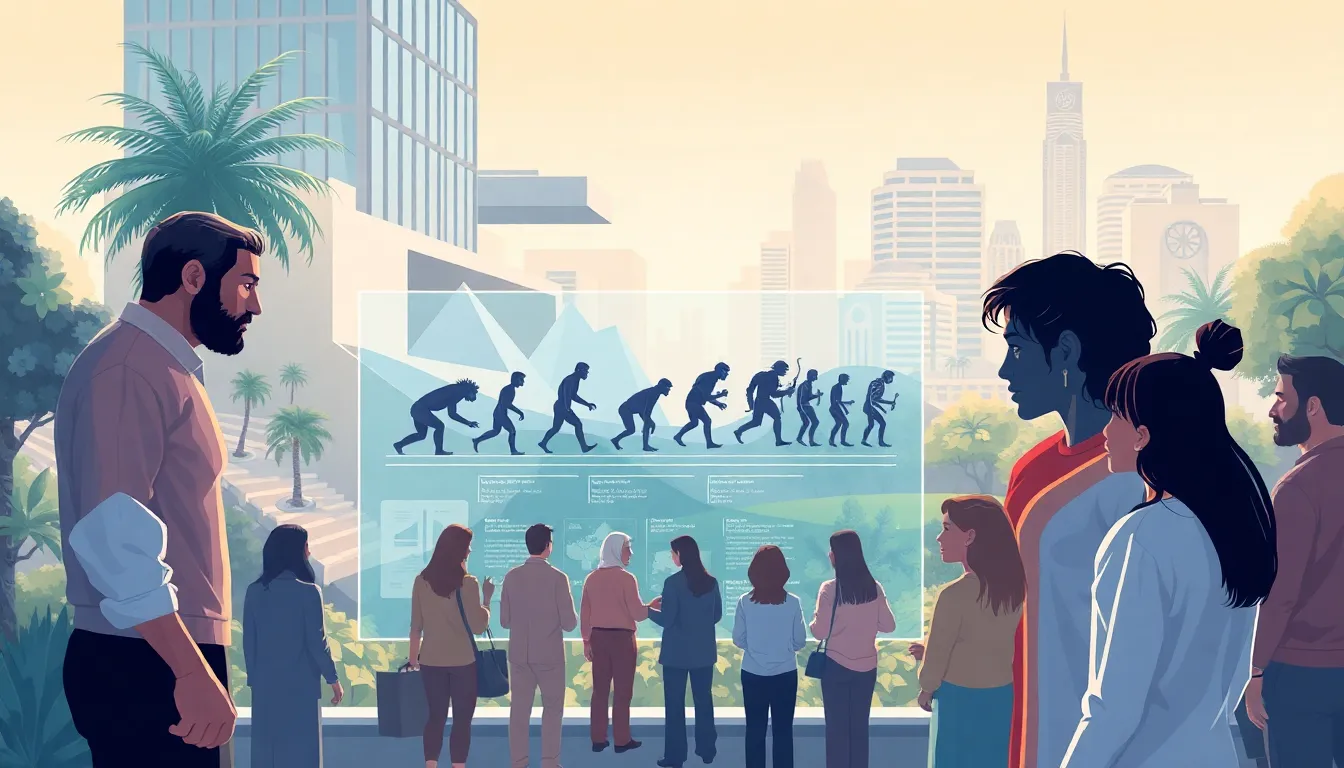Table of Contents
ToggleImagine a world where humans have evolved so much that we can communicate telepathically or perhaps even regenerate limbs like some lizards. Sounds like a sci-fi movie, right? But as we stand on the cusp of monumental advancements, understanding the future of human evolution is crucial. The journey we’ve taken has already been nothing short of extraordinary. Join us as we explore the fascinating trajectories of human evolution and what the future might hold.
Understanding Human Evolution

The Journey of Human Evolution
Human evolution can be summarized as a remarkable narrative stretching over millions of years. From the emergence of Homo habilis, who crafted tools, to the advanced civilization we see today, each stage showcases our species’ adaptability. The interplay of environmental pressures and biological changes has guided us through various challenges, significantly impacting our physical and cognitive abilities.
These advances showcase a relentless push toward survival, enabling humans to thrive in diverse habitats. While the mechanisms driving this evolution, natural selection, mutation, and migration, remain constant, the context surrounding human life is now rife with complexities that will shape future changes.
Key Milestones in Human Development
Several pivotal moments define our evolution, shaping not just our biology but our cultures and societies. Key milestones include:
- The discovery of fire, providing protection and enabling cooked food, which improved nutrition.
- The development of language, allowing communication that transcends simple survival needs.
- The advent of farming, leading to settled societies and the birth of civilization.
These milestones allow us to craft narratives of how humanity evolved, reflecting our drive for innovation and survival. The question we must ponder now is how these forces will guide us into the future.
Factors Influencing Future Evolution
Technological Advancements and Their Impact
Technology is no longer just a tool: it’s becoming part of our evolutionary process. Consider how the internet shapes our communication habits and influences social structures. As technology evolves, so will our cognitive functions. The potential integration of artificial intelligence could redefine intelligence itself. What happens when machines can outperform humans in cognition? It poses intriguing questions around our place in the evolutionary hierarchy.
Also, with advancements in biocompatible materials and nanotechnology, humans might physically merge with machines. Can you imagine a future where humans enhance their bodies using tech? It’s a striking possibility that reshapes the narrative of evolution.
Genetic Engineering and Synthetic Biology
The rise of genetic engineering introduces powerful tools for human advancement. With the ability to manipulate DNA, we can theoretically combat genetic diseases and mitigate aging. CRISPR technology, renowned for its precision, opens doors to modifying human traits. Future generations might inherit enhanced abilities thanks to these technologies. This reality poses ethical dilemmas that society will need to confront. Are we playing god or simply accelerating nature’s course?
As genetic engineering progresses, the line between human and machine blurs, urging us to ask how much control we want over our evolutionary path.
Environmental Changes and Adaptation
Climate Change and Its Effects on Humanity
The looming threat of climate change will drastically shape human evolution. With rising temperatures and unpredictable weather patterns, humanity will face new survival challenges. Those who can adapt, metabolically, physiologically, or behaviorally, will thrive. Imagine humans developing distinct traits, such as heat resistance or modified circulatory systems, aimed at combating climate-related diseases.
Also, food sources will become scarce, forcing adaptation in dietary habits. The species that can innovate will endure. This reality pushes us toward a future where adaptability may become humanity’s most crucial trait.
Urbanization and Lifestyle Shifts
As more people flock to cities, the lifestyle changes will further impact human biology. Urban environments introduce unique pressures, from air quality challenges to varying social dynamics. Individuals may find their health morphing based on these surroundings. For instance, those who navigate high-stress environments regularly could develop resilience traits.
The modern lifestyle, steeped in technology and sedentary behavior, introduces new evolutionary challenges. This scenario poses a fascinating paradox: as we develop conveniences, we may inadvertently limit our physical evolution.
Predicted Evolutionary Traits for Future Humans
Cognitive and Physical Adaptations
As we look to the future, certain adaptations seem likely. Cognitive evolution might manifest in enhanced memory or problem-solving abilities, resulting from reliance on technological aids. This reliance raises an interesting question, will our brains evolve to know less? It’s possible that as we lean more on technology, the human brain might streamline functions for efficiency rather than memorization.
Physically, traits that favor longevity and health will likely dominate. Expect advancements in body resilience, perhaps emerging as adaptations to urban life or climate change. Humans may evolve thicker skin or increased lung capacity to filter toxins, mirroring animals that inhabit polluted environments.
Social Evolution and Behavioral Changes
Psychologically, the future could herald changes in social behavior. With technology enhancing connectivity, new norms around relationships and communities might arise. Humans may develop deeper collaborative tendencies, fostering a society that values collective achievement over individual prowess.
The augmentation of empathy, heightened by social media, could reshape our interactions, enhancing understanding across diverse populations. These potential shifts signify a significant leap in human evolution, not just biologically but socially.
Ethical Considerations in Human Evolution
The Role of Ethics in Genetic Manipulation
The leap into genetic engineering and technology calls for a brisk assessment of ethics. What guidelines should enforce these practices? Who decides what traits are desirable? The consequences of manipulating our genetic code can be profound. Unequal access or unintended consequences could create divides that make the societal issues of today seem trivial.
A collective discussion around ethics is essential. It involves not just scientists and technologists but the public. Engaging citizens establishes a social contract that reflects shared values, ensuring that science serves humanity as a whole.
Societal Implications of Evolutionary Changes
As humanity evolves, socio-political ramifications will undoubtedly follow. As genetic enhancements become more mainstream, societal structures will need to adapt. Will there be a divide between the enhanced and unenhanced? Such considerations should provoke debate about the essence of what it means to be human.
Ethical dilemmas present themselves as technology and biology converge. Societies must navigate these challenges carefully: prioritizing inclusivity while tackling the potential for inequity becomes paramount.







